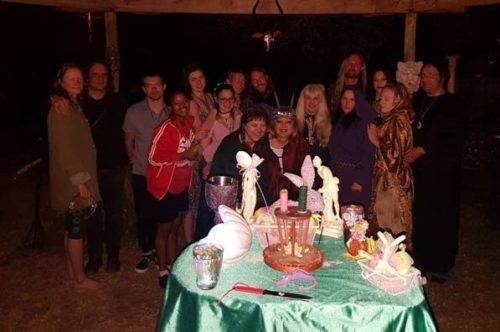![]() [While most of TWH readers are celebrating the beginning of fall, those in the Southern Hemisphere are welcoming spring. Guest writer and blogger Damon Leff provides a brief look into the Pagan groups and their practice in South Africa]
[While most of TWH readers are celebrating the beginning of fall, those in the Southern Hemisphere are welcoming spring. Guest writer and blogger Damon Leff provides a brief look into the Pagan groups and their practice in South Africa]
SOUTH AFRICA — South African Pagans, who represent a tiny and largely insular religious minority, celebrated the vernal equinox Sept. 22
While a large percentage of this ‘identity community’ are solitary practitioners, there are a few notable covens who host public seasonal events. These groups are well supported by their own members and by newcomers eager to explore Pagan ritual for the first time.
The Grove, arguably the oldest and largest teaching coven in South Africa, was founded in 1996 in Johannesburg. It’s High Priestess, Shanyn McCardle (Red Ravyn Shadow, as she is known by her covenors) is a practitioner of what she terms Celtic Paganism and Witchcraft, a tradition she inherited from her own Irish mother.

The Grove [courtesy]
McCardle recollects finding her true spiritual home through her introduction to Wicca. “When I formed my first circle with my family members, my mother realized that it was family tradition that we were practising, forbidden in her time. So, when I get a seeker on the path, I will rarely turn them away.”
Leanne Middleton is the High Priestess of the Coven of the Crossroads (COTC), also a teaching coven, founded in 2017 and also based in Johannesburg. Leanne describes herself as an eclectic Witch. COTC also identifies as an eclectic teaching coven and so offers its advanced students an introductory overview of certain left hand path principles in a safe and supportive environment.
Unlike The Grove, COTC advertises its public seasonal gatherings.
Middletown says that Coven of the Crossroads welcomes everyone. “We are open to all paths and welcome one and all at our Sabbats and in our coven; traditional healers, left-hand path practitioners, shamans and people of any pantheon are welcome.”
“There is a need in the community for acceptance of individual paths,” Middeltown adds, “and I have found an excellent response in the community as a result of this.”
The Clan of Kheper Temple, formed in 2005 and based in Cape Town, is a Chartered Temple of the Correllian Tradition, possibly the largest international tradition of its kind in the world. It was founded by the Rt Rev. Raene Packery, affectionately known by her Clan as Lady Raene.
Lady Raene is an elder and Arch High Priestess of the Correllian Tradition in South Africa. Clan of Kheper Temple practices and teaches Correllian Wicca, a tradition founded by Lady Orpheis, and which draws upon her own Native American and Scottish traditional lineage.
The Temple also draws on what Lady Raene terms the Aradian lineage, European Witchcraft, Spiritualism and Hermeticism. The group’s seasonal gatherings are open to the wider Pagan community, and it welcomes both experienced and new Pagans to its festivities.

Clan of Kheper Temple [courtesy]
She says, “By providing a sacred space for all to learn, and facilitating the practical expression and application of that which is taught, I too never stop growing and learning.”
All three covens embrace the European or American heritage of their religious practices, but also remember to offer respect to the African context and land in which they live, and to spirit of place.
To varying degrees, they incorporate either African folk-lore, ritual practices, and traditional African plant allies in their rituals.
For example, all of the people interviewed use a plant called Imphepho. It is a sacred South African herb (Helichrysum spp) with regional variants, used by traditional healers to commune with the ancestors. Imphepho is typically dried and smoldered as an incense.
Some South African Pagans are exploring the common paths that link European and African religious traditions, and are respectfully learning from both ancestral streams to create a new and unique synergy of different traditions. Some believe that this is, in fact, imperative in order to practice Pagan religious traditions that are largely based on foreign systems and the seasonal cycles of the Northern Hemisphere.
This re-emergence of old traditions and the re-creation of new traditions of synergy aptly mirrors what is often celebrated at the vernal equinox. As is believed, the old must inevitably adapt and give way to new growth; the new can neither forget nor dismiss that from which it evolved. And, both old and new must be of service to that and those who are yet to come.
The blessings of the equinox be with you
The Wild Hunt is not responsible for links to external content.
To join a conversation on this post:
Visit our The Wild Hunt subreddit! Point your favorite browser to https://www.reddit.com/r/The_Wild_Hunt_News/, then click “JOIN”. Make sure to click the bell, too, to be notified of new articles posted to our subreddit.